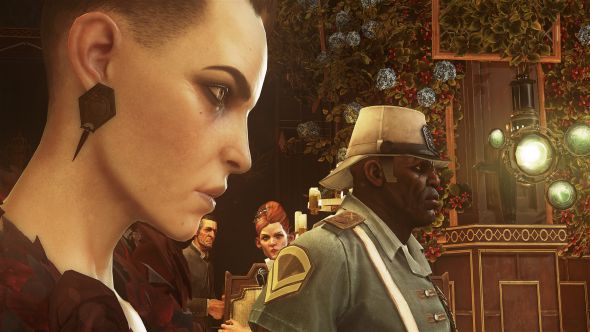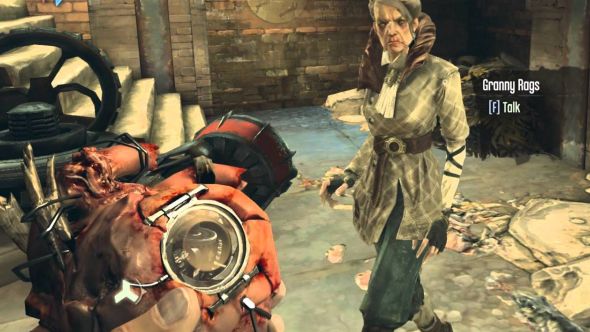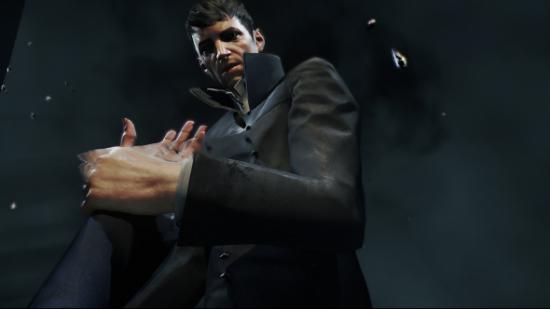Dishonored 2 is a model sequel. To use an architectural metaphor – because it’s hard to think about Arkane’s series without conjuring high balconies and chimney stacks – Dishonored builds on its predecessor’s already vertiginous achievements, while turning familiar patterns into clever new motifs. Much is gained, and nothing is lost.
Read more: the best stealth games on PC.
Well: one thing is lost. The Outsider, the godlike man who bestows his gifts to the player in the Dishonored games, has lost his voice in the sequel. Arkane have hired a new voice actor, Robin Lord Taylor – Gotham’s Penguin, no less – to play their nebulous figure from the Void.
You may well not have noticed the change. It’s been four years since the original came out, after all. But it caused a minor upset a couple of weeks ago, when Lord Taylor narrated the story of Dishonored so far in a superbly animated storybook trailer.
“The magic is gone,” wrote one commenter in the trailer’s comments. “The Outsider is now no longer wise and mysterious to me. This guy makes him sound 13.”
“Somehow I don’t see this voice fit this person/entity,” said another. “He is supposed to be this all-knowing and all-seeing being from the abyss that grants powers for a high price, yet he sounds like a teenager.”
The chief complaints, then, are a) that the new Outsider isn’t sufficiently otherworldly, and b) that he could stand to sound a bit more adult than Lord Taylor’s soft, youthful delivery allows. So what is the Outsider supposed to be?
“The Outsider is not classically a ‘trickster god,’ but he’s done a few things that probably remind people of other trickster examples, like granting man some kind of forbidden boon,” explained Dishonored lead designer Ricardo Bare in 2014.
“You could say he has ‘Underworld’ god qualities which represent the unconscious, mystery, secret or repressed desires, creativity, etc. The ‘Shadow Self’ from Jungian archetypes. This aspect, in my opinion, is much stronger than the trickster qualities.”

Clearly, Bare knows his own co-creation, not to mention his mythology and psychology. But more than Hades or the other murky deities of the underworld, the Outsider reminds me of gods in the ancient Greek tradition who went topside – fickle individuals who played with humans not as part of some grand plan, but out of boredom or irritation.
You’ll know Zeus, who had a habit of abducting humans to satisfy his baser instincts. On one famous occasion, he turned into a swan to impregnate a mortal, who later gave birth to Helen of Troy – best remembered for launching a thousand ships and a long war. Careless at best. Then there’s the time that Zeus took the form of an eagle to kidnap an attractive Trojan prince, so that the man could warm his bed and pour his drinks.
There’s another story that finds a hunter out in the forest, where he happens upon the goddess Artemis as she bathes. Incensed, the goddess promptly turns him into a deer – before taking control of the minds of his dogs and commanding them to consume him. It’s a murderous power combo straight out of a Dishonored gif.
As a mortal in Greek mythology, it seems the best you could hope to do was avoid attracting the attention of your gods, lest you become subject to their adolescent whims.

If the Outsider sounds young, it’s because he’s an adolescent god too – first pushed unwillingly into the Void by an occult group as a 15-year-old orphan. It’s worth noting that Lord Taylor’s predecessor, Billy Lush, didn’t lend the character any thespian gravity either. He also sounded young – and more than that, human. Sarcastic. At times even contemptuous of Corvo.
What you hear from the Outsider in Dishonored 1 is matched by what you see. His face is permanently pinched in a teenage expression of annoyance. Dressed in cufflinked jacket, navy trousers and knee-high boots, he wouldn’t stand out among any of Dunwall’s denizens – if not for the swirling tendrils of the Void licking at his edges. He looks eminently human. Which, like the Greek gods, makes him terrifying.
An aloof but emotional being, the Outsider plucks mortals like Corvo, Daud and Delilah from their lives and grants them great powers. He does so not to make them agents of positive change – though they can be – but because he finds them “interesting”. He’s curious, creating ripples in the world just for something to do. At one point, he tells Corvo he expects “a good show” in return for his favour.
As with the Greek gods, the mortals in Dishonored’s world build shrines to the Outsider. Some, like the Da Vincian inventor and artist Anton Sokolov, attempt to earn an audience via summoning rituals and sacrifices. They hope he is a spiritual force who can provide guidance, a magician who will improve their lives. But never in Dishonored is the Outsider seen to act out of anything other than personal impulse.

Once you’ve accepted the Outsider as a Greek god, it turns out Dishonored 1 fits remarkably well into the template of Greek tragedy.
Bear with me. The tragedies tended to have one or two fickle gods floating around causing trouble, driven by human motivations like revenge or jealousy. They usually had a chorus, too – a peripheral group of actors who provided commentary on the events of the play. Which is exactly what Corvo’s heart does: point the organ at a figure in the game, give it a squeeze, and it’ll whisper sometimes terrible insights in the voice of the deceased empress.
What’s more, Dishonored features a tragic hero thrust into an awful situation after a single moment of weakness: his failure to save the empress. If Corvo can be falsely accused of murder, we know that anyone can, which makes him relatable – “a man like ourselves”, as Aristotle put it.
And the game has a point of recognition, or ‘anagnorisis’, which I won’t spoil, where the player suddenly recognises a shocking truth about a character’s identity. One that sheds new and tragic light on the hero’s situation.
Which is all to say that the Outsider’s casting is just right, whether he’s played by stroppy-sounding Lush or youthful Lord Taylor. And that Dishonored would make a cracking stage adaptation. Call me, Arkane.
